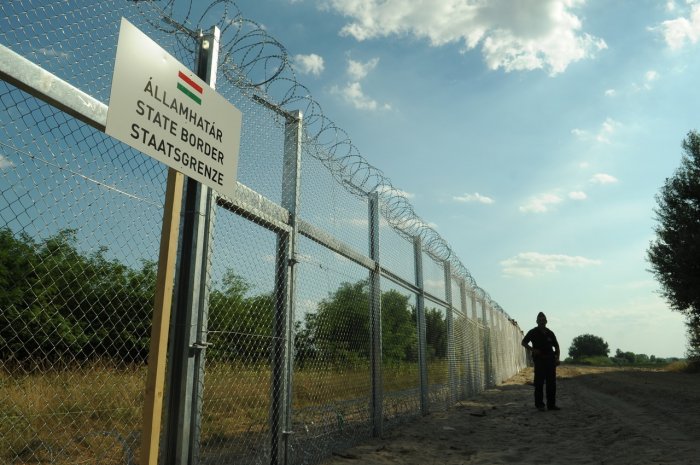Council of Europe worried by added restrictions Hungary plans for NGOs

Wikimedia Commons/Délmagyarország/Schmidt Andrea
Nils Muižnieks, Commissioner for Human Rights at the Council of Europe (CoE), has expressed serious concerns about proposed additional restrictions to the work of NGOs in Hungary under the so-called “Stop Soros” package of bills submitted by the Hungarian government to Parliament on Tuesday.
The barbed wire fence at Hungaryʼs southern border, erected in 2015 (photo: Wikimedia Commons/Délmagyarország/Schmidt Andrea).
“I am seriously concerned at the legislative package recently announced by the Hungarian government under the name Stop Soros,” said Muižnieks in a statement published on the CoE website yesterday. “If adopted by Parliament, it will introduce further arbitrary restrictions to the indispensable work of human rights NGOs and defenders in Hungary.”
Hungaryʼs government on Tuesday submitted a bill to Parliament that would require organizations to pay a 25% duty on funding from abroad that it says “supports illegal migration”. The bill would exempt from the duty those organizations that can demonstrate their foreign funding is used for humanitarian aid or does not support illegal migration.
The bill is part of the governmentʼs earlier announced Stop Soros package, in response to what the government repeatedly alleges is a plan of Hungarian-born investor and philanthropist George Soros to forcibly resettle migrants in Europe. Soros has repeatedly denied the existence of such a plan, while the Open Society Foundations founded by Soros have strongly condemned the new legislation.
As reported earlier, the proposed 25% levy would apply to organizations that receive more funding from abroad than from Hungarian citizens at home, and would be collected by the National Tax and Customs Administration (NAV).
Separate bills also submitted on Tuesday would require organizations that support illegal migration to register and be licensed by the minister in charge of refugee affairs, and would allow authorities to keep individuals who support illegal migration eight kilometers away from the Hungarian side of the border.
Stigmatizing civil society
In his statement yesterday, Muižnieks recalled that in a letter sent to the Hungarian Parliament in May 2017, he had set out his concerns regarding the then draft Law on the Transparency of Organizations Supported from Abroad, which he said “stigmatized a large number of organizations pursuing lawful activities in the field of human rights and introduced far-reaching restrictions on freedom of association in contravention of international human rights standards”.
“I regret that instead of addressing those pressing human rights concerns, the Hungarian government appears now intent on intensifying stigmatization and restrictions against NGOs working specifically on migration-related issues,” he noted.
Muižnieks expressed strong concern over the proposed creation of “immigration restraining orders” that can be used to prevent any person deemed to “support the unlawful entry and residence of a third-country national” from accessing an 8 km zone from external borders.
“Considering the context in which the proposed measures were conceived, there is an obvious risk that arbitrary restrictions may be applied on the freedom of movement of persons involved in refugee assistance at the border,” he noted.
The commissioner also expressed alarm at the escalating rhetoric used by the Hungarian government to portray NGOs and immigrants as a threat to national security.
“This discourse is stirring up among the population fears and intolerance towards foreigners and mistrust towards civil society organizations,” he said. “I call once more on Hungary to refrain from penalizing, stigmatizing or putting at any disadvantage whatsoever NGOs, including those working in the field of migration.”
Vote on package only after elections
Speaking Thursday afternoon after a joint meeting of the parliamentary groups of the governing parties, Fidesz parliamentary group leader Gergely Gulyás said the parties had agreed unanimously to support the Stop Soros package, debate of which can begin in Parliament next week. At the same time, he stressed that a final decision is only expected after the general elections in April, online news portal index.hu reported.
Gulyás conceded that the governing parties do not have the two-thirds majority in the House needed to pass the points of the draft legislation affecting the law on national security. At the same time, he noted the “attacks” that have been launched against Hungary on the international stage with regard to the package, and asserted that the opposition fundamentally supports immigration.
Responding to the concerns of Muižnieks, János Halász, the Fidesz parliamentary group spokesman, adopted a familiar line in response to outside criticism of Hungarian government policy.
“Nils Muižnieks, the Commissioner for Human Rights at the Strasbourg-based Council of Europe, is George Sorosʼs man,” he was quoted as saying by index.hu.
Meanwhile, in an e-mail sent to the Budapest Business Journal, human rights NGO the Hungarian Helsinki Committee provided a link to an unofficial translation of the legislative package from the Hungarian Prime Minister’s Office, which consists of three proposals that were submitted to Parliament on February 13.
The e-mail also noted that the proposals are available on the Hungarian parliamentary website along with information about their progress (in Hungarian only) here, here and here.
SUPPORT THE BUDAPEST BUSINESS JOURNAL
Producing journalism that is worthy of the name is a costly business. For 27 years, the publishers, editors and reporters of the Budapest Business Journal have striven to bring you business news that works, information that you can trust, that is factual, accurate and presented without fear or favor.
Newspaper organizations across the globe have struggled to find a business model that allows them to continue to excel, without compromising their ability to perform. Most recently, some have experimented with the idea of involving their most important stakeholders, their readers.
We would like to offer that same opportunity to our readers. We would like to invite you to help us deliver the quality business journalism you require. Hit our Support the BBJ button and you can choose the how much and how often you send us your contributions.











